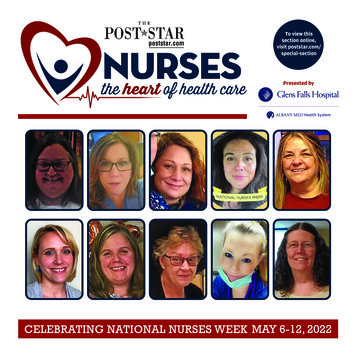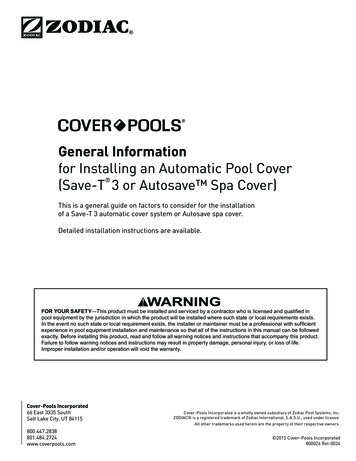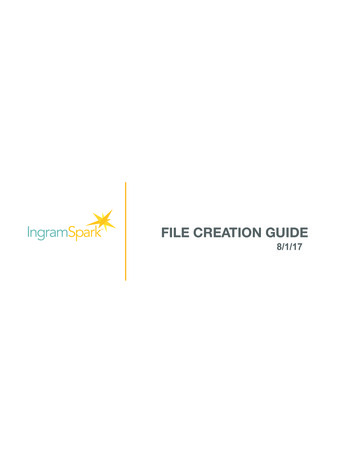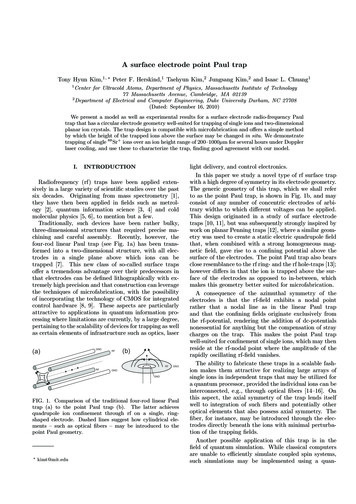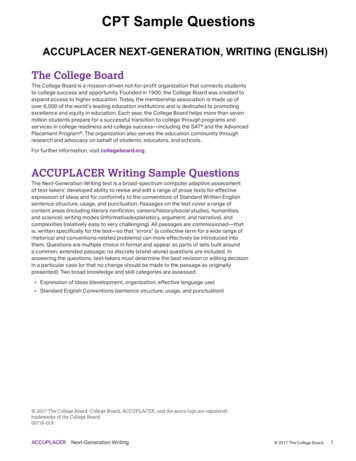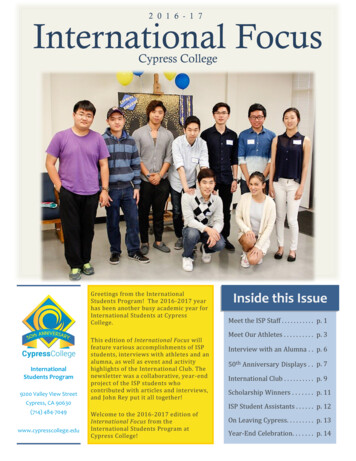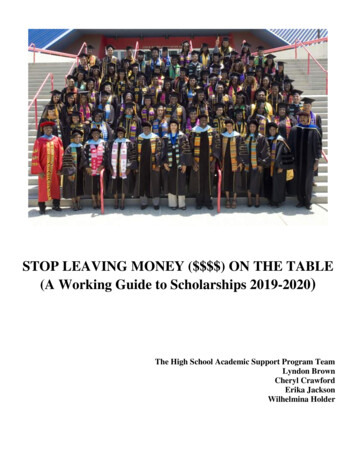
Transcription
ii
Cover Design by Kim L. Silverman, National Science Board Office, National Science Foundationi
NSB-09-20Investing in the FutureNSF Cost Sharing Policies for aRobust Federal Research EnterpriseAugust 3, 2009i
About the National Science BoardThe National Science Board (Board) is composed of 25 Presidentially appointed, Senate-confirmed Members, including the Director of the National Science Foundation (NSF). The Board establishes the policiesof NSF within the framework of applicable national policies set forth by the President and Congress. Inthis capacity, the Board identifies issues that are critical to NSF’s future, approves NSF’s strategic budgetdirections, approves annual budget submissions to the Office of Management and Budget, approves newprograms and major awards, analyzes NSF’s budget to ensure progress and consistency along the strategicdirection set for NSF, and ensures balance between initiatives and core programs. The Board also serves asan independent policy advisory body to the President and Congress with a statutory obligation to “ renderto the President and the Congress reports on specific, individual policy matters related to science and engineering andeducation in science engineering, as the Board, the President, or the Congress determines the need for such reports” and to“render to the President and the Congress no later than January 15 of each even numbered year, a report on indicators ofthe state of science and engineering in the United States.” (42 U.S.C. Section 1863) SEC.4.(j)(2) and (1).National Science Board MembersSteven C. Beering, Chairman, President Emeritus, Purdue University, West Lafayette, IndianaPatricia D. Galloway, Vice Chairman, Chief Executive Officer, Pegasus Global Holdings, Inc.,Cle Elum, WashingtonMark R. Abbott, Dean and Professor, College of Oceanic and Atmospheric Sciences, Oregon StateUniversity, Corvallis, OregonDan E. Arvizu, Director and Chief Executive, National Renewable Energy Laboratory (NREL),Golden, ColoradoBarry C. Barish,* Director, Global Design Effort for International Linear Collider, Linde Professor ofPhysics, Emeritus, California Institute of Technology, Pasadena, CaliforniaCamilla P. Benbow, Patricia and Rodes Hart Dean of Education and Human Development, PeabodyCollege of Education and Human Development, Vanderbilt University, Nashville, TennesseeRay M. Bowen, President Emeritus, Texas A&M University, College Station, TexasJohn T. Bruer, President, The James S. McDonnell Foundation, Saint Louis, MissouriG. Wayne Clough, Secretary, Smithsonian Institution, Washington, DCFrance A. Córdova, President, Purdue University, West Lafayette, IndianaKelvin K. Droegemeier, Associate Vice President for Research, Regents’ Professor of Meteorology andWeathernews Chair, University of Oklahoma, Norman, OklahomaJosé-Marie Griffiths, Dean and Professor, School of Information and Library Science, Director ofBiomedical Informatics, TraCS Institute, School of Medicine, University of North Carolina, Chapel Hill,North CarolinaEsin Gulari, Dean of Engineering and Science, Clemson University, Clemson, South Carolina* Consultantii
Elizabeth Hoffman,* Executive Vice President and Provost, Iowa State University, Ames, IowaLouis J. Lanzerotti, Distinguished Research Professor of Physics, Center for Solar Terrestrial Research,Department of Physics, New Jersey Institute of Technology, Newark, New JerseyAlan I. Leshner, Chief Executive Officer and Executive Publisher, Science, American Association for theAdvancement of Science, Washington, DCG.P. “Bud” Peterson, President, Georgia Institute of Technology, Atlanta, GeorgiaDouglas D. Randall, Professor and Thomas Jefferson Fellow, University of Missouri, Columbia, MissouriArthur K. Reilly, Senior Director, Strategic Technology Policy, Cisco Systems, Inc., Ocean,New JerseyDiane L. Souvaine, Professor and Chair, Department of Computer Science, Tufts University, Medford,MassachusettsJon C. Strauss, Interim Dean, Edward E. Whitacre Jr. College of Engineering, Texas Tech University,Lubbock, TexasKathryn D. Sullivan, Director, Battelle Center for Mathematics and Science Education Policy, John GlennSchool of Public Affairs, Ohio State University, Columbus, OhioThomas N. Taylor, Roy A. Roberts Distinguished Professor, Department of Ecology and EvolutionaryBiology, Curator of Paleobotany in the Natural History Museum and Biodiversity Research Center, TheUniversity of Kansas, Lawrence, KansasRichard F. Thompson, Keck Professor of Psychology and Biological Sciences, University of SouthernCalifornia, Los Angeles, CaliforniaMember ex officio:Arden L. Bement, Jr., Director, National Science Foundation, Arlington, VirginiaCraig R. Robinson, Acting Executive Officer, National Science Board and National Science Board OfficeDirector, Arlington, VirginiaTask Force on Cost Sharing, Committee on Strategy and Budget Kelvin K. Droegemeier, ChairmanMark R. AbbottCamilla P. BenbowJon C. StraussThomas N. TaylorRichard F. Thompson Steven C. Beering, ex officioArden L. Bement, Jr., ex officioPatricia D. Galloway, ex officio* Consultantiii
iv
ContentsMemorandum from the ChairmanviiAcknowledgmentsixProcess for Producing the ReportxInvesting in the Future: NSF Cost Sharing Policies for a Robust Federal Research EnterpriseReport Motivation1Executive Summary3Introduction4Overview of Cost Sharing4Recent NSF Cost Sharing Policy5Views on Cost Sharing7Recommendations9Other Findings and Recommendations14Conclusion15Endnotes16Appendix A: NSF Policy Statement on Cost Sharing21Appendix B: NSF Implementation Plan25Appendix C: Abridged History of Federal and NSF Cost Sharing Policies27Appendix D: Roundtable Discussion on Cost Sharing (1), December 7, 2007Agenda and List of Participants31Appendix E: Roundtable Discussion on Cost Sharing (2), July 9, 2008Agenda and List of Participants37Appendix F: Roundtable Discussion on Cost Sharing (3), July 10, 2008Agenda and List of Participants45v
vi
August 3, 2009MEMORANDUM FROM THE CHAIRMAN OF THE NATIONAL SCIENCE BOARDSUBJECT: Investing in the Future: NSF Cost Sharing Policies for a Robust Federal Research EnterpriseThe National Science Board (Board) established the Task Force on Cost Sharing (Task Force) in October2007 to examine issues related to NSF cost sharing policy, in response to a directive in the August 2007America COMPETES Act (P.L. 110-69). This Congressional directive focused specifically on the impactsof the Board’s 2004 decision to eliminate NSF program-specific mandatory cost sharing requirements onexisting programs that were developed around industry partnerships and historically required cost sharing,such as the Engineering Research Centers program and the Industry/University Cooperative ResearchCenters program. The Task Force broadened the scope of its examination to include other capacity-buildingprograms that historically required significant cost sharing, such as the Experimental Program to StimulateCompetitive Research, and additional issues related to NSF cost sharing policy.This report prescribes a set of recommendations with two primary objectives: (1) to allow, but narrowlycircumscribe, the application of mandatory cost sharing requirements in NSF programs in which costsharing is foundational to achieving programmatic goals, and (2) to prohibit voluntary committed costsharing in NSF proposals and thus eliminate post-award tracking and reporting requirements associated withsuch cost sharing.The Board firmly believes that prohibiting voluntary committed cost sharing, and permitting mandatorycost sharing requirements only in limited and appropriate circumstances, will not reduce institutionalcommitment and financial contributions to NSF-sponsored projects or negatively impact institutionalstewardship of Federal resources. Instead, it likely will enhance the ability of institutions to strategically andflexibly plan, invest in, and conduct research projects and programs, and will promote equity among granteeinstitutions in NSF funding competitions.Steven C. BeeringChairmanNational Science BoardNational Science Foundation4201 Wilson BoulevardArlington, Virginia 22230(703) 292-7000http://www.nsf.gov/nsbemail: NSBoffice@nsf.gov
viii
AcknowledgmentsWe are deeply grateful to the many members of the science and engineering research and educationcommunity who generously contributed their time and insight to the development of this report. Especiallydeserving of recognition are those individuals who participated in three public roundtable discussionsheld at the National Science Foundation (NSF), the lists of whom are provided in Appendixes D, E, and Fof this report. We also thank those who responded to public comment opportunities on issues related tocost sharing and on a draft of this report, including in particular the Council on Governmental Relations,American Association of Universities, National Association of State Universities and Land-Grant Colleges,and Association of Independent Research Institutes. Their valuable contributions and continued interest inthe Board’s activity on behalf of their member colleges and universities is greatly appreciated.We also appreciate the valuable input provided throughout the report development process by the followingNSF staff members: Mr. Thomas Cooley, Chief Financial Officer and Director, Office of Budget, Finance,and Award Management (BFA); Ms. Jean Feldman, Head, Policy Office, Division of Institution and AwardSupport (DIAS), BFA; Mr. James Noeth, Senior Audit Manager, Office of Inspector General (OIG); Ms.Joanna Rom, Deputy Director, BFA; Ms. Mary Santonastasso, Director, DIAS, BFA; Ms. Beth Strausser,Senior Policy Specialist, Policy Office, DIAS, BFA; Ms. Joyce Werking, Audit Manager, OIG; and Mr. CharlieZiegler, Special Assistant for Cost Analysis and Audit Resolution, DIAS, BFA.The National Science Board Office provided valuable and essential support to the Task Force’s work.Especially deserving of recognition is Ms. Jennifer Richards, Executive Secretary to the Task Force, whoprovided the primary staff support for this effort and had a significant role in drafting this report. We alsoextend our thanks to Dr. Michael Crosby, Interim Vice Chancellor for Research, University of Hawaii – Hilo(formerly Executive Officer and Board Office Director, National Science Board); Dr. Russell Moy, SeniorAdvisor and General Council, Southeastern Universities Research Association (formerly Senior Science andEngineering Policy Analyst and Legal Affairs Coordinator); and Dr. Robert Webber, Senior Science PolicyAnalyst.ix
Process for Producing the ReportTo prepare this report, the Board engaged in extensive dialogue with and outreach to NSF seniormanagement, policy staff, and other subject matter experts, as well as the research community. Primaryobjectives of the Board throughout this study were to actively involve stakeholders who will be affected bychanges to NSF cost sharing policy, and to fully examine the implications of any potential policy changes.This report is the second of two reports focused on NSF cost sharing policy released by the Board followinga Congressional directive in the 2007 America COMPETES Act (P.L. 110-69). The directive requiredthe Board to examine certain consequences of the Board’s 2004 revision to NSF cost sharing policy thateliminated all mandatory cost sharing requirements in NSF programs. In February 2008, the Boardreleased its first report, Report to Congress on Cost Sharing Policies at the National Science Foundation (NSB-0817). The report focused specifically on issues raised by Congress, related to the impacts of its 2004 policyrevision on programs that were developed around industry partnerships and historically required industrycost sharing. To inform this report, the Board held a public roundtable discussion in December 2007 andseveral discussions with leaders in the Engineering Research Centers program, the Industry/UniversityCooperative Research Centers program, and the Experimental Program to Stimulate Competitive Research.The Board also consulted recent literature on cost sharing, including a special issue of the National Councilof University Research Administrators journal, Research Management Review, dedicated to the topic.To develop this second report, the Board engaged in additional outreach activities to broadly solicit inputfrom stakeholders. These activities included a request for comment from NSF’s Advisory Committees inApril 2008; two public roundtable discussions in July 2008 with invited representatives of stakeholdergroups; and a two-month public comment opportunity from August to October 2008, publicized throughthe Federal Register and by an NSF Dear Colleague letter. Additionally, the Board held a three-week publiccommunity opportunity on a draft of this report from January to February 2009. Throughout theseactivities, the Board actively involved NSF senior management and policy officials.The Board’s recommendations herein are based on careful analyses of available information, includingperspectives from multiple stakeholder groups such as grantee institutions, organizations representinggrantee institutions, and NSF. Unfortunately, although general concurrence exists regarding the level,frequency, and impacts of cost sharing in NSF-sponsored research, little robust quantitative evidence isavailable on which to base definitive conclusions. Data describing cost sharing for NSF awards is recordedonly through dollar commitments listed on Line M in the proposal budget. Line M commitments do notdistinguish between resources committed to meet mandatory cost sharing requirements and resourcescommitted as voluntary cost sharing. Further, Line M commitments do not include any cost sharingcommitments made elsewhere in proposals (e.g., in-kind resource commitments made in the proposal text).x
Report MotivationOn August 9, 2007, the America COMPETES Act (P.L. 110-69) directed the National Science Board(Board) to “evaluate the impact of its [2004] policy to eliminate cost sharing for research grants andcooperative agreements for existing programs that were developed around industry partnerships andhistorically required industry cost sharing, such as the Engineering Research Centers [ERCs] and Industry/University Cooperative Research Centers [I/UCRCs].” The Act directed that the Board “also considerthe impact that the cost sharing policy has on initiating new programs for which industry interest andparticipation are sought.” The Act also mandated that the National Science Foundation (NSF) implementmandatory cost sharing in the Major Research Instrumentation Program and the Robert Noyce TeacherScholarship Program.In response to this Congressional directive, the Board’s Committee on Strategy and Budget (CSB)established a Task Force on Cost Sharing1 in October 2007 to examine the issues raised by Congress, withemphasis on the Board’s 2004 revision to NSF cost sharing policy that eliminated NSF program-specificmandatory cost sharing requirements. Prior to 2004, specific NSF programs could set mandatory costsharing requirements for solicited proposals. The 2004 revision to NSF cost sharing policy did not impactthe statutory requirement for one percent cost sharing for all unsolicited proposals.2The Board undertook an intensive study to accomplish the tasks described above and broadened the scopeof its examination to include other capacity-building NSF programs that historically required significant costsharing, such as the Experimental Program to Stimulate Competitive Research (EPSCoR).The Board issued a report to Congress in February 2008 that recommended, for immediateimplementation, a suite of targeted changes to NSF cost sharing policy. The Board committed toengage in additional study and issue this more comprehensive follow-up report that contains additionalrecommendations for NSF cost sharing policy.1
2
Investing in the Future: NSF Cost Sharing Policiesfor a Robust Federal Research EnterpriseExecutive SummaryScience and engineering research and education are cornerstones of the U.S. science and technologyenterprise. Following World War II, the National Science Foundation (NSF) was established as the onlyFederal agency explicitly charged with helping to maintain the overall health of science and engineeringacross all disciplines through the provision of research and education assistance grants to colleges,universities, and other institutions.Federally sponsored research is fundamentally a partnership between the Federal Government andinstitutions performing the research. Both are committed to achieving mutually beneficial outcomes, andboth have demonstrated agreement to share in the costs of the enterprise. Institutions that participatein Federally sponsored research provide resources to the enterprise in a multiplicity of ways to coverdirect and indirect costs associated with research activities. These resources include general-purpose stateand local government appropriations applicable to research, private gifts, activities funded internally,investments in infrastructure and programs, faculty start-up packages, mandatory and voluntary costsharing, costs of implementing unfunded research compliance mandates, and unrecovered indirect costs.The portion of institutional resources termed “cost sharing” refers to costs of a specific Federally sponsoredproject or program that are not borne by the Federal Government.3, * Cost sharing includes mandatory costsharing, voluntary committed cost sharing, and voluntary uncommitted cost sharing provided to specificprojects, and also unrecovered indirect costs associated with Federally sponsored research projects.The application of mandatory cost sharing requirements, and consideration of both mandatory andvoluntary committed cost sharing in the NSF merit review and award decision processes, are governed byNSF cost sharing policy. In recent years, NSF has attempted to clarify the role of mandatory cost sharingin NSF-sponsored research and to ensure that voluntary committed cost sharing plays no role in NSF awarddecisions.In this report, the National Science Board (Board) prescribes a set of recommendations with two primaryobjectives: (1) to allow, but narrowly circumscribe, the application of mandatory cost sharing requirementsin NSF programs in which cost sharing is foundational to achieving programmatic goals, and (2) toprohibit voluntary committed cost sharing in NSF proposals and thus eliminate post-award tracking andreporting requirements associated with such cost sharing. These recommendations are intended to improveconsistency and clarity of NSF cost sharing practices and policy and to maximize the effectiveness ofinstitutional dollars invested in research. The Board firmly believes that prohibiting voluntary committedcost sharing, and permitting mandatory cost sharing requirements only in limited and appropriatecircumstances, will not reduce institutional commitment and financial contributions to NSF-sponsoredprojects or negatively impact institutional stewardship of Federal resources. Instead, it likely will enhancethe ability of institutions to strategically and flexibly plan, invest in, and conduct research projects andprograms, and will promote equity among grantee institutions in NSF funding competitions.*The Board believes the term “cost sharing” inappropriately suggests that the value of shared participation in the researchenterprise – by Federal agencies providing funding and institutions conducting the work – is limited to financial dimensionsalone.3
IntroductionScience and engineering research and education are cornerstones of the U.S. science and technologyenterprise. Over the Nation’s history, research and innovation have generated new technologies andindustries, improved quality of life, and promoted economic prosperity. The Federal Government haslong recognized the need to provide public support for the science and engineering research enterprise.Following World War II, the National Science Foundation (NSF) was established as the only Federal agencyexplicitly charged with helping to maintain the overall health of science and engineering across all disciplinesthrough the provision of research and education assistance grants to colleges, universities, and otherinstitutions.Federally sponsored research is fundamentally a partnership between the Federal Government and theinstitutions performing the research. As the National Science and Technology Council observed in itsApril 1999 report, Renewing the Federal Government-University Research Partnership for the 21st Century, thispartnership in the conduct of research “has yielded benefits that are vital to each [partner]. It continues toprove exceptionally productive, improving the quality of life, educating the next generation of scientistsand engineers, and contributing to America’s economic prosperity.”4 Each partner is uniquely suited toproviding necessary elements for the success of the enterprise: the Federal Government provides fundingfor and a system through which to select the most meritorious basic science and engineering research ideas,and colleges, universities, and other institutions provide the intellectual resources of their researchers. Bothpartners are committed to achieving mutually beneficial outcomes, and both have demonstrated agreementto share in the costs of the enterprise.Overview of Cost SharingInstitutions that participate in Federally sponsored research provide resources to the enterprise in amultiplicity of ways to cover direct and indirect costs associated with research activities. These include, butare not limited to, general-purpose state and local government appropriations applicable to research, privategifts, activities funded internally, investments in infrastructure and programs, faculty start-up packages,mandatory and voluntary cost sharing, costs of implementing unfunded research compliance mandates, andunrecovered indirect costs. In total, academic institutions contributed about 20 percent of total researchand development expenditures at U.S. colleges and universities in FY 2007.5 The portion of institutionalresources termed “cost sharing” refers to costs of a specific Federally sponsored project or program thatare not borne by the Federal Government.6 Cost sharing includes mandatory cost sharing, voluntarycommitted cost sharing, and voluntary uncommitted cost sharing provided to specific projects, and alsounrecovered indirect costs associated with Federally sponsored research projects. Mandatory Cost Sharing: Institutional resources required by NSF for specific sponsored projects, usuallywith different requirements for different programs and solicitations. At NSF, mandatory cost sharingrequirements outside of the statutory one percent requirement (eliminated in June 2007) have not beenimplemented for unsolicited proposals. Voluntary Cost Sharing: Institutional resources made available to a specific sponsored project solely at thediscretion of the grantee institution. These resources fall into two categories:4
– Voluntary Committed Cost Sharing: Institutional voluntary cost sharing resources that are pledgedformally in an NSF proposal and that become binding and auditable commitments to that sponsoredproject upon award of the grant. These commitments may be articulated in numerous places inNSF proposals, including in the narrative, letters of support, or budget (e.g., faculty requesting zerosalary support from NSF for time contributed to the project).– Voluntary Uncommitted Cost Sharing: Institutional voluntary cost sharing resources that are notpledged formally in an NSF proposal but are subsequently made available upon receipt of theaward. Institutions are not bound to contribute such resources, and the resources are notauditable. Unrecovered Indirect Costs: Although not formally termed “cost sharing”, unrecovered indirect costsassociated with NSF-sponsored research constitute real costs of conducting research that must beborne by grantee institutions.7 Indirect costs for NSF-sponsored projects are determined by applyingthe current institutional indirect cost rate, as negotiated between the grantee institution and cognizantFederal agency, to the modified total direct costs of the project.8 Indirect costs consist of both facilities(F) and administrative (A) components, known in combination as F&A. Currently, grantee institutionsperforming NSF-sponsored projects can recover a maximum of 26 percent of administrative costs, perOMB Circular A-21.9 This cap was established in 1991, and all administrative costs incurred above itrepresent de facto mandatory cost sharing because they must be absorbed by grantee institutions.Recent NSF Cost Sharing PolicyThe application of mandatory cost sharing, and consideration of both mandatory and voluntary committedcost sharing in the NSF merit review and award decision processes, are governed by NSF cost sharingpolicy. Several important recent revisions to NSF cost sharing policy have attempted to clarify the role ofmandatory cost sharing in NSF-sponsored research, and to ensure that voluntary committed cost sharingplays no role in NSF award decisions. See Appendix C for an abridged history of Federal and NSF costsharing policies.In 1999, the Board issued a cost sharing policy statement (NSB-99-92) clarifying the following expectationsfor mandatory cost sharing: (1) mandatory cost sharing is an eligibility, not a review, criterion; (2) NSFcost sharing requirements beyond the statutory one percent requirement will be clearly stated in theprogram solicitation; (3) only statutory cost sharing will be required for unsolicited proposals;10 and (4)any post-review, pre-award budget reduction of 10 percent or more from the amount proposed should beaccompanied by a corresponding reduction in the scope of the project, unless the program officer, principalinvestigator, and institution clearly agree that the project as proposed can be carried out at a lesser levelof support from NSF with no expectation of any uncompensated institutional contribution beyond thatformally reflected as cost sharing. The policy was intended to enhance consistency in the application ofmandatory cost sharing requirements in NSF programs, including the prevention of any consideration ofmandatory cost sharing for proposal evaluation and decision purposes and the elimination of all instances ofcost sharing compelled by post-review reductions in NSF project budgets.In 2002, the Board revised its cost sharing policy statement to clarify enforcement of the provisions of the1999 cost sharing policy statement regarding budget negotiations. The Board issued a new cost sharingpolicy statement (NSB-02-188), stating that in budget negotiations, any reduction of 10 percent or morefrom the amount proposed should be accompanied by a corresponding reduction in the scope of the project.5
In 2004, the Board approved a revision to NSF cost sharing policy that eliminated mandatory cost sharingrequirements in all NSF programs. This policy revision superseded previous guidance regarding mandatorycost sharing requirements and had numerous positive consequences for both NSF and grantee institutions.Further, it aligned NSF cost sharing practices with those of other Federal funding agencies.11Historically, in accordance with Congressional requirements, NSF required that each grantee share in thecost of NSF research projects resulting from unsolicited proposals.12 The 2004 revision to NSF cost sharingpolicy did not impact the statutory cost sharing requirement. This requirement was eliminated for awardsmade on or after June 1, 2007, by removal of the Congressional requirement from NSF appropriationslanguage.The elimination of mandatory cost sharing requirements was intended to make certain that mandatorycost sharing would not be considered during the NSF merit review and award decision processes; toremove eligibility barriers to participation in certain NSF programs by institutions unable to provide therequired cost sharing; and to eliminate the lack of uniformity in cost sharing requirements and philosophyof use across NSF programs. Also, it reduced the financial burden on institutions to provide mandatorycost sharing, provided institutions with more flexibility to strategically invest their own resources, andeliminated the administrative burden associated with tracking and reporting mandatory cost sharing.However, the 2004 policy revision also may have brought about several potentially negative consequencesfor certain types of NSF programs that had previously required mandatory cost sharing and dependedupon it to achieve programmatic objectives (e.g., those based on university-industry partnerships or thedevelopment of large-scale, long-term research programs). Potential impacts on these programs include: Removal of institutional leverage to garner industry participation in programs that seek to builduniversity-industry partnerships (e.g., the Engineering Research Centers [ERC] and Industry/University Cooperative Research Centers [I/UCRC] programs); Generation of ambiguity in NSF programs for which institutional “participation” (inherently meaningcost sharing) remained a required component, but which could no longer require mandatory costsharing (e.g., the Science and Technology Centers program); Removal of institutional leverage and incentive to ensure sustainability for large-scale, long-termresearch programs (e.g., large centers); and Removal of leverage to garner financial support for programs that involve substantial commitment tobuilding research capacity and infrastructure (e.g., the Experimental Program to Stimulate CompetitiveResearch [EPSCoR]).In its February 2008 report to Congress, the Board recommended that NSF reinstate mandatory costsharing for three programs judged to have experienced negative consequences of the 2004 policy revision:
Richard F. Thompson, Keck Professor of Psychology and Biological Sciences, University of Southern California, Los Angeles, California Member ex officio: Arden L. Bement, Jr., Director, National Science Foundation, Arlington, Virginia Craig R. Robinson, Acting Executive Officer, National Science Board and National Science Board Office



